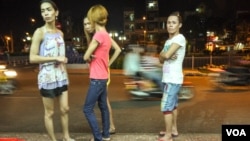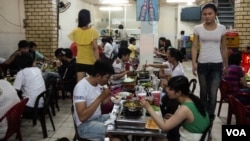HO CHI MINH CITY, VIETNAM —
Right in the heart of the city, next to the Opera House and the old stomping grounds of war correspondents, a rare kind of party raged on a recent Friday: It was a drag show.
A hip young crowd descended on Centro bar around midnight to mingle with drag queens, men who donned green eyelashes, lace tops normally worn by women, and even traditional Vietnamese silk.
That this happened so openly, in a square heavily trafficked by tourists, expats, and well-heeled Vietnamese, speaks volumes about the country’s LGBT (Lesbian, Gay, Bisexual and Transgender) people. Their movement is gaining momentum.
“They no longer hide themselves,” said Tran Quoc Vu, who pitches in at his sister’s Papa cafe, perhaps one of the oldest LGBT-friendly joints in the city. After the coffee shop opened in the late 1990s at the Turtle Lake roundabout, the gay clientele started to grow, in part because LGBT singers and actors frequent the place.
Cafes in Vietnam are far from run-of-the-mill. Many have themes and campy decorations. At Papa, they evoke a country home setting. Pastel-blue walls, birds in cages, and climbing plants fill the second floor, where gay customers tend to hang out during the day. At night, everything flips: Straight people go upstairs, while below, gay people and others perform “hat voi nhau,” a popular feature at cafes in which guests take turns singing on a small stage.
Visitors come for the entertainment, as well as for the culture of tolerance.
“It feels comfortable, fun, we can just joke around, or kiss, or hold hands,” said Huynh Phuoc, 29. “There’s no stress, we’re not afraid or hesitant.”
Wearing a purple-and-blue plaid button-up and shiny black shoes, the makeup artist says people at other cafes sometimes look at him and his group of gay friends with surprise, unlike at Papa.
But that is happening less and less. Not only have some officials come out in favor of allowing same-sex marriage, but the populace is increasingly tolerant of LGBT people. A concerted media campaign in recent years has pushed the message that homosexuals are no different from heterosexuals, often referred to as “binh thuong,” or normal. Today, most urban Vietnamese are more likely to regard gays with curiosity or discomfort, rather than outright discrimination.
Gays and lesbians are more likely to face discrimination in the countryside. But even in rural areas, awareness of LGBT issues is on the rise.
While conservative Hanoi has a few gay-friendly cafes, Ho Chi Minh City remains Vietnam’s uncontested capital for LGBT people. Businesses that open their doors to them are sprouting up across the city. They’re as diverse as karaoke bars, dance clubs, spas, salons, and swimming pools. Often, LGBT people decide among themselves which places welcome them, spreading the word across community web forums.
One LGBT refuge, the seafood restaurant Thuy Linh, didn’t start out that way. Le Thi Thu Thuy, who opened the business, originally refused to accept her niece as transgender when she came out. But the experience helped Thuy learn to embrace the community, eventually making her eatery famous for its transgender waitresses.
“When they’re younger we can yell at them, but now that they’re older, we have to accept it,” Thuy said. “You can’t change the truth.”
Like most Vietnamese businesses, Thuy Linh includes an upstairs loft shared by the waitresses, who act as a support group for one another. Thuy is less activist, more pragmatist. She said if people disagree with the transgender lifestyle, they don’t have to eat at her restaurant. But she seems to know the reputation has been good for business.
Feasting on a hotpot of clams and snails next to a rainbow flag, one diner says he grew curious after passing by Thuy Linh several times. Now Nguyen Minh Tri, 26, is something of a regular at the restaurant, which he praises for employing transgender people.
“It’s a community,” said Tri, a game designer. “They can help each other and no one discriminates against them.”
Most of these places serve LGBT Vietnamese. In recent years, though, Centro, which hosted the drag show, has become the place to be seen among gay socialites, both foreign and local. Tucked behind the iconic Caravelle Hotel, Centro seems to be filling a void created after the nearby Q Bar was shut down a couple years ago. Literally underground, the bar lay beneath the Opera House and attracted people of all countries and sexual identities.
Businesses that cater to the gay community come and go in this rapidly evolving city. But Vietnam’s liberalization suggests LGBT people have more options than ever. Tran Tung heads up ICS, the country’s top LGBT political lobby, and looks forward to a day when such businesses are no longer needed.
“We welcome those initiatives,” he said, but “in the end we want to work toward a society that accepts LGBT everywhere.”
A hip young crowd descended on Centro bar around midnight to mingle with drag queens, men who donned green eyelashes, lace tops normally worn by women, and even traditional Vietnamese silk.
That this happened so openly, in a square heavily trafficked by tourists, expats, and well-heeled Vietnamese, speaks volumes about the country’s LGBT (Lesbian, Gay, Bisexual and Transgender) people. Their movement is gaining momentum.
“They no longer hide themselves,” said Tran Quoc Vu, who pitches in at his sister’s Papa cafe, perhaps one of the oldest LGBT-friendly joints in the city. After the coffee shop opened in the late 1990s at the Turtle Lake roundabout, the gay clientele started to grow, in part because LGBT singers and actors frequent the place.
Cafes in Vietnam are far from run-of-the-mill. Many have themes and campy decorations. At Papa, they evoke a country home setting. Pastel-blue walls, birds in cages, and climbing plants fill the second floor, where gay customers tend to hang out during the day. At night, everything flips: Straight people go upstairs, while below, gay people and others perform “hat voi nhau,” a popular feature at cafes in which guests take turns singing on a small stage.
Visitors come for the entertainment, as well as for the culture of tolerance.
“It feels comfortable, fun, we can just joke around, or kiss, or hold hands,” said Huynh Phuoc, 29. “There’s no stress, we’re not afraid or hesitant.”
Wearing a purple-and-blue plaid button-up and shiny black shoes, the makeup artist says people at other cafes sometimes look at him and his group of gay friends with surprise, unlike at Papa.
But that is happening less and less. Not only have some officials come out in favor of allowing same-sex marriage, but the populace is increasingly tolerant of LGBT people. A concerted media campaign in recent years has pushed the message that homosexuals are no different from heterosexuals, often referred to as “binh thuong,” or normal. Today, most urban Vietnamese are more likely to regard gays with curiosity or discomfort, rather than outright discrimination.
Gays and lesbians are more likely to face discrimination in the countryside. But even in rural areas, awareness of LGBT issues is on the rise.
While conservative Hanoi has a few gay-friendly cafes, Ho Chi Minh City remains Vietnam’s uncontested capital for LGBT people. Businesses that open their doors to them are sprouting up across the city. They’re as diverse as karaoke bars, dance clubs, spas, salons, and swimming pools. Often, LGBT people decide among themselves which places welcome them, spreading the word across community web forums.
One LGBT refuge, the seafood restaurant Thuy Linh, didn’t start out that way. Le Thi Thu Thuy, who opened the business, originally refused to accept her niece as transgender when she came out. But the experience helped Thuy learn to embrace the community, eventually making her eatery famous for its transgender waitresses.
“When they’re younger we can yell at them, but now that they’re older, we have to accept it,” Thuy said. “You can’t change the truth.”
Like most Vietnamese businesses, Thuy Linh includes an upstairs loft shared by the waitresses, who act as a support group for one another. Thuy is less activist, more pragmatist. She said if people disagree with the transgender lifestyle, they don’t have to eat at her restaurant. But she seems to know the reputation has been good for business.
Feasting on a hotpot of clams and snails next to a rainbow flag, one diner says he grew curious after passing by Thuy Linh several times. Now Nguyen Minh Tri, 26, is something of a regular at the restaurant, which he praises for employing transgender people.
“It’s a community,” said Tri, a game designer. “They can help each other and no one discriminates against them.”
Most of these places serve LGBT Vietnamese. In recent years, though, Centro, which hosted the drag show, has become the place to be seen among gay socialites, both foreign and local. Tucked behind the iconic Caravelle Hotel, Centro seems to be filling a void created after the nearby Q Bar was shut down a couple years ago. Literally underground, the bar lay beneath the Opera House and attracted people of all countries and sexual identities.
Businesses that cater to the gay community come and go in this rapidly evolving city. But Vietnam’s liberalization suggests LGBT people have more options than ever. Tran Tung heads up ICS, the country’s top LGBT political lobby, and looks forward to a day when such businesses are no longer needed.
“We welcome those initiatives,” he said, but “in the end we want to work toward a society that accepts LGBT everywhere.”





